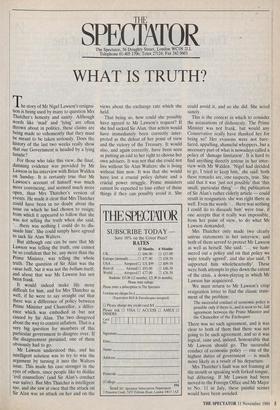SPECTATOR
The Spectator, 56 Doughty Street, London WC1N 2LL Telephone 01-405 1706; Telex 27124; Fax 242 0603
WHAT IS TRUTH?
he story of Mr Nigel Lawson's resigna- tion is being used by many to question Mrs Thatcher's honesty and sanity. Although Words like 'mad' and 'lying' are often thrown about in politics, these claims are being made so vehemently that they must be meant to be taken seriously. Does the history of the last two weeks really show that our Government is headed by a lying lunatic?
For those who take this view, the final, damning evidence was provided by Mr Lawson in his interview with Brian Walden on Sunday. It is certainly true that Mr Lawson's account of himself was much more convincing, and seemed much more open, than Mrs Thatcher's version of events. He made it clear that Mrs Thatcher could have been in no doubt about the issue on which he had chosen to resign; from which it appeared to follow that she was not telling the truth when she said, —.there was nothing I could do to dis- suade him'. She could simply have agreed to sack Sir Alan Walters.
But although one can be sure that Mr Lawson was telling the truth, one cannot be so confident that he, any more than the Prime Minister, was telling the whole truth. The question of Sir Alan was the cases belli, but it was not the bellum itself; and about that war Mr Lawson has not been frank.
It would indeed make life more difficult for him, and for Mrs Thatcher as well, if he were to say straight out that there was a difference of policy between Prime Minister and Chancellor, a differ- ence which- was embodied in but not caused by Sir Alan. The two disagreed about the way to control inflation. That is a very big question for members of this particular government to disagree over. If the disagreement persisted, one of them obviously had to go.
Mr Lawson understood this, and his intelligent solution was to try to win the argument by turning it into the Walters issue. This made his case stronger in the eyes of others, since people like to dislike `evil counsellors' (and Sir Alan's conduct was naive). But Mrs Thatcher is intelligent too, and she saw at once that the attack on Sir Alan was an attack on her and on the views about the exchange rate which she held.
That being so, how could she possibly have agreed to Mr Lawson's request? If she had sacked Sir Alan, that action would have immediately been correctly inter- preted as the defeat of her point of view and the victory of the Treasury. It would also, and again correctly, have been seen as putting an end to her right to choose her own advisers. It was not that she could not live without Sir Alan Walters: she is living without him now. It was that she would have lost a crucial policy debate and a crucial power struggle. Prime ministers cannot be expected to lose either of these things if they can possibly avoid it. She
could avoid it, and so she did. She acted sanely.
This is the context in which to consider the accusations of dishonesty. The Prime Minister was not frank, but would any Conservative really have thanked her for being so? Her evasions were not bare- faced, appalling, shameful whoppers, but a necessary part of what is nowadays called a policy of 'damage limitation'. It is hard to find anything directly untrue in her inter- view with Mr Walden. 'Nigel had decided to go, I tried to keep him,' she said: both these remarks are, one suspects, true. She said that it was 'just not possible' that 'this small, particular thing' — the publication of Sir Alan's rather elderly article — could result in resignation: she was right there as well. Even the words `... there was nothing I could do to dissuade him' were true, if one accepts that it really was impossible, from her point of view, to do what Mr Lawson demanded.
Mrs Thatcher only made two clearly untrue statements in her interview, and both of them served to protect Mr Lawson as well as herself. She said, `... we ham- mered out a policy and on that policy we were totally agreed', and she also said, 'I supported him wholeheartedly'. These were both attempts to play down the extent of the crisis, a down-playing in which Mr Lawson has acquiesced. We must return to Mr Lawson's crisp resignation letter to find the classic state- ment of the problem: The successful conduct of economic policy is possible only if there is, and is seen to be, full agreement between the Prime Minister and the Chancellor of the Exchequer.
There was no such agreement, and it was clear to both of them that there was not going to be such agreement, and so it was logical, sane and, indeed, honourable that Mr Lawson should go. The successful conduct of economic policy — one of the highest duties of government — is much more likely as a result of his departure.
Mrs Thatcher's fault was not foaming at the mouth or speaking with forked tongue, but dithering. If Mr Lawson had been moved to the Foreign Office and Mr Major to No. 11 in July, these painful scenes would have been avoided.










































































 Previous page
Previous page